|
Capital!
|
|
|
|

|
| # ? May 4, 2024 01:42 |
|
Make it the capital!
|
|
|
|
Hellioning posted:Ah, yes, my favorite video game, Imperator: Carthage. Sufet: Carthage, thank you very much. Imperator was merely a rank/honor in the Roman army before it's destruction oh no I have to relocalise all instances of 'emperor' and 'caesar/tsar' going forward
|
|
|
|
Yuiiut posted:Sufet: Carthage, thank you very much. Imperator was merely a rank/honor in the Roman army before it's destruction it begins Also, Capital
|
|
|
|
Personally I think carthage has reached their natural limit now that they've secured themselves from Rome. Naturally, they will turn their seafaring expertise towards colonizing brazil 1000 years early
|
|
|
|
Consecrate
|
|
|
|
Yuiiut posted:Sufet: Carthage, thank you very much. Imperator was merely a rank/honor in the Roman army before it's destruction Anywhere in Europe without Carthaginian influence could just have "High Kings" or "Over-Kings" or "Kings-of-Kings" maybe.
|
|
|
|
Just have Atilla be extra juiced so Khan comes into vogue 1000 years early
|
|
|
|
In mixed Mongol/Germanic areas, "Khan" and "King" get mixed into "Kong"
|
|
|
|
I'm imagining that in the AU the big history meme is a picture of Cato the Elder that says "I TOLD YOU TO DELENDA EST"
|
|
|
|
GunnerJ posted:In mixed Mongol/Germanic areas, "Khan" and "King" get mixed into "Kong" The most feared ruler of the middle ages is going to be Don Ki Khang
|
|
|
|
Did we ever figure out what our dating scheme was counting down to?
|
|
|
|
karmicknight posted:Did we ever figure out what our dating scheme was counting down to? I think Christianity is still happening, but we have axes instead of crosses, and one of the magi was an actual ruler and didn't just gently caress off after their one scene in the Bible. EDIT: If the magi actually were important, I guess you can tell that I wasn't raised Christian. SirPhoebos fucked around with this message at 17:04 on Sep 10, 2022 |
|
|
|
karmicknight posted:Did we ever figure out what our dating scheme was counting down to? Yeah, our current lunatic king went and gave some peasant-child in Bethlehem myrrh because of a star, and is probably a big supporter of the Hypsistarians. He also legalized human sacrifice so he's a little confused, but he's got the spirit. Alternatively, it could've been counting down to the Carthaginian empire - not sure when they hit that button.
|
|
|
|
6: Death on the Nile Transcript of visiting Professor Onleigh’s speech on Aegyptian foreign policy in the classical era. Much ink has been spilled on the question of Yonu, the authenticity of his reign and the accuracy of the traditional accounts of him being one of the magi who came to the infant Christ. While initial attacks on the traditional account likely went too far, with some revisionist scholars rejecting that Yonu ever existed, time and more recent discoveries along the Black Sea - not least the public gravesite on the lower Istros with coins emblazoned with his face - do indicate that the traditional account does contain some level of truth. Regardless of whether it was due to him genuinely physically visiting Bithleem and proclaiming Christ king - a story which to my mind rings of later missionaries adding their own gloss on some genuine historical event - it is clear that the Ptolmies, Kleopatra in particular, really did have a genuine opposition and even hatred of Yonu and Scythians, as shown by their extension of ‘protection’ over the Macedonian rump state. 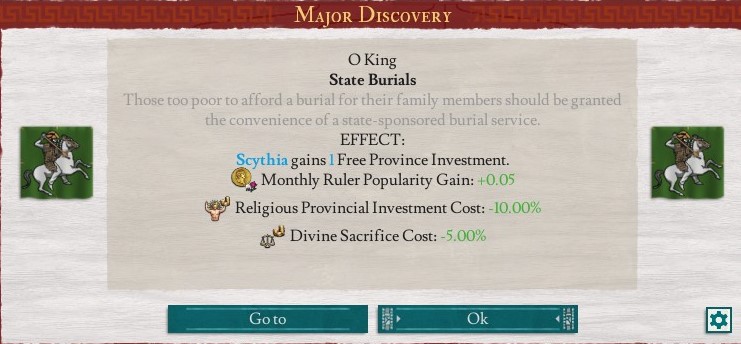 Claims that this was all driven by realpolitik must, I’m afraid, fail. Was the Triumvirate a threat to Aegyptian interests? Yes, in the abstract - the shipwrecks we have discovered and dated in recent decades do indicate a decrease (though not the complete cessation) of trade between Hellas and Aegypt after the Scythian conquest, and the Celts were no doubt a pressing issue for the Pergammonese kingdom which was a close friend of Aegypt. But it is not true that the threat to the West can only be seen with the historian’s hindsight. All significant threat the Romans had posed as an external state had clearly ended, with the republic’s descent into fratricidal self-war complete. Iberia was nearly completely subjugated. Carthage, above all other concerns, was empirically the most powerful and threatening state in the region, and had every incentive to try to claim the breadbasket of the classical world.  The decision, therefore, to meddle in the Hellenic peninsular and seek to stand in opposition to the Scythians southern migration cannot be justified on a purely rational, realist basis. It is no doubt true to some extent that the Ptolmies, a Hellenic dynasty, felt some fraternity for the subjugated Hellenes, though whether that was enough to justify outright guarantees backed by the Army of Nile? I am skeptical, though I recognise that this is ultimately a matter of speculation. No historian could reasonably claim surety regarding the motives of peoples 2 millenia removed from us, and you are no doubt aware my learned colleagues differ from me on this question. 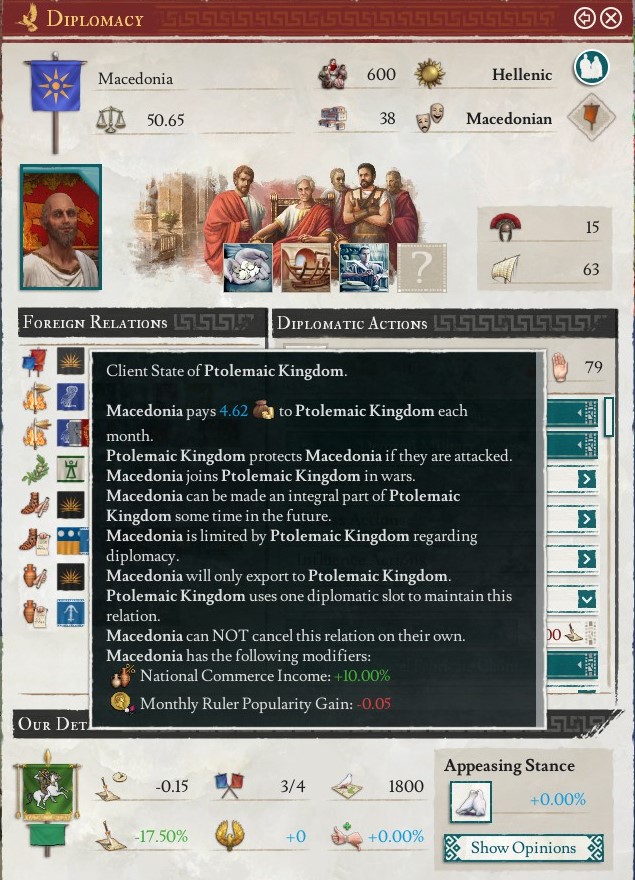 While we have no contemporary source on Yonu’s thoughts, let me ask this: even if he had no religious affinity for the growing Christian sect, would he not be overjoyed to see the turmoil and unrest roiling his foes in one of their vulnerable border regions? We need not accept the claim that Yonu was a prophet - no, excuse me, no interruptions at this point, I am not saying that we must reject it, just that it is immaterial to my analysis, sit down - to realize he would no doubt be supportive of any source of unrest in Aegypt. 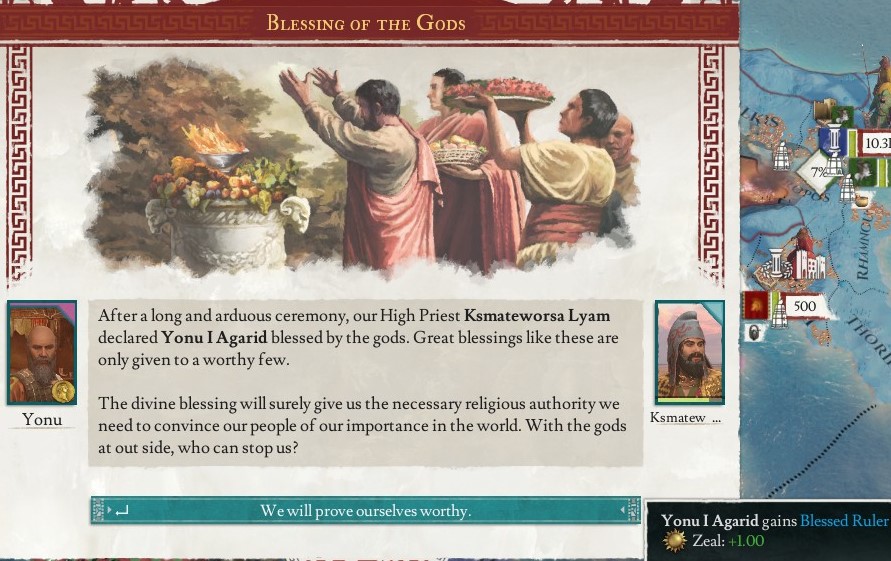 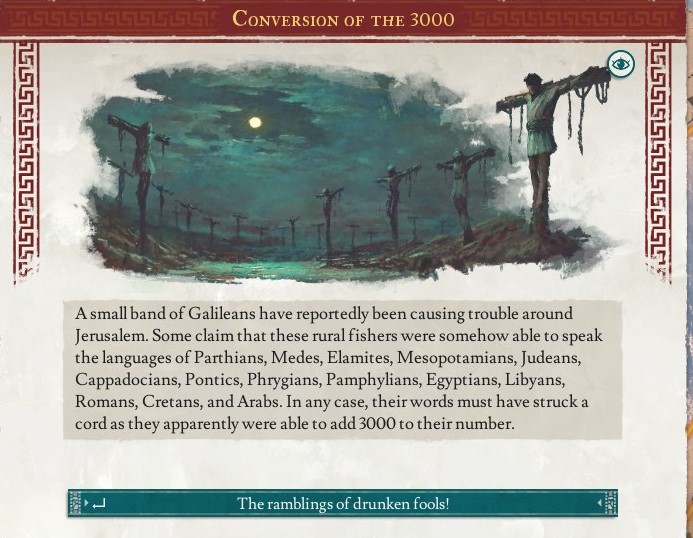 It certainly would have influenced his decision to disregard the Aegyptian proclamation and invade Macedonia. The error that Kleopatra made in offering the full force of the nilotic kingdom is apparent with hindsight, but given the position she had placed herself in - positioning herself as the last great successor of Alexander left standing, protector of what was left of Hellas and the Selucid state, a Basilinna of learning, of enlightenment, of ancient tradition, guardian against the ‘barbarous hordes’ of the Triumvirate and Parthia - there truly was no choice in the matter. 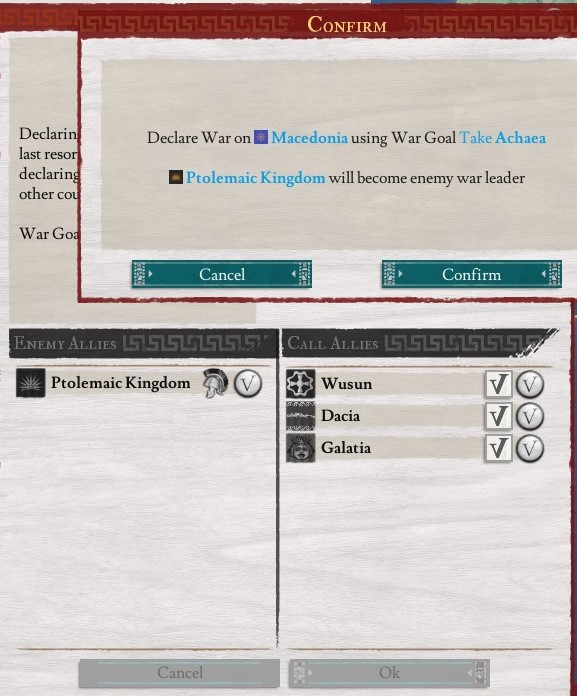 And, to be fair, while the full consequences of the war took their time to fall on Aegypt, the Ptolmaic army Galatia was, while ultimately unsuccessful, never fully routed and destroyed, unlike the Selucid forces. Indeed, by the standards of most Triumvirate wars, the gains - parts of Western Pergammon ceding to Galatia as indemnity for the damage the war had caused on the Celtic countryside, southern Hellas (or at least the Macedonian parts thereof) annexed into Scythia - were limited in scope and extent. 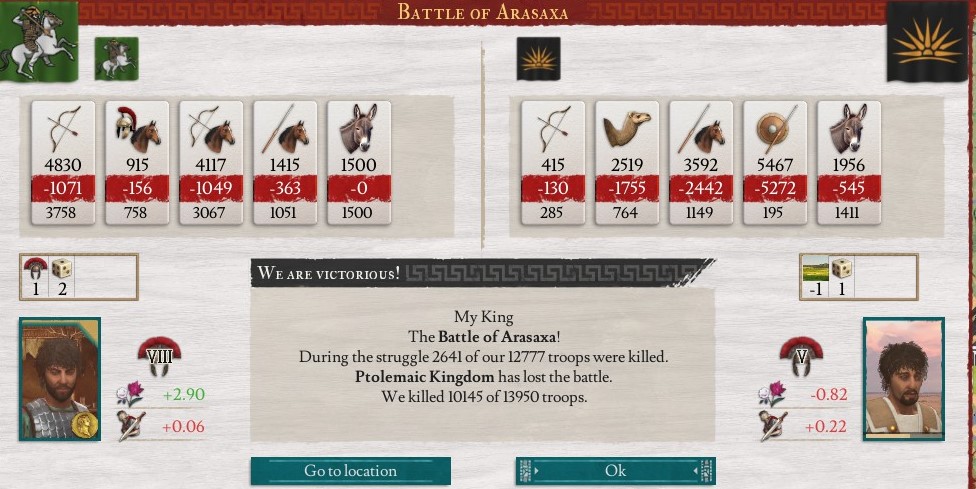 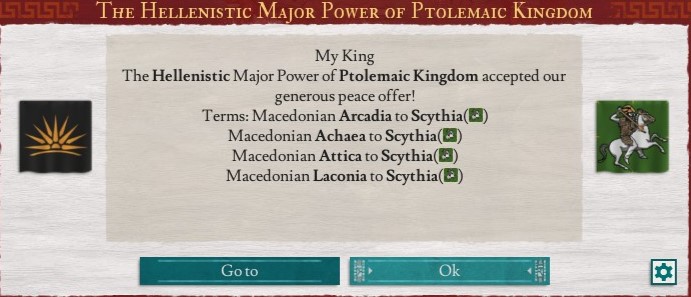 A defeat, however, is still a defeat - Scythia wasted no time with its newly free hand on the Hellenic peninsular before seeking the subjugation of the lesser Hellenic statelets, which, try as they might, were unable to stand up to the Scythian horsemen and their allies, even collectively. Only the lack of any notable navy kept some island princes outside the horsemen’s dominion - and that was a lack which Scythia was seeking to promptly rectify, with plans drawn up based off newly captured shipyards for a truly grand navy. More devastatingly for the Hellenic world, Pericles' great work of architecture - the Partheon at Athens - was torn down and the marble shipped northward, to be incorporated in a grand shrine in Tauricia. 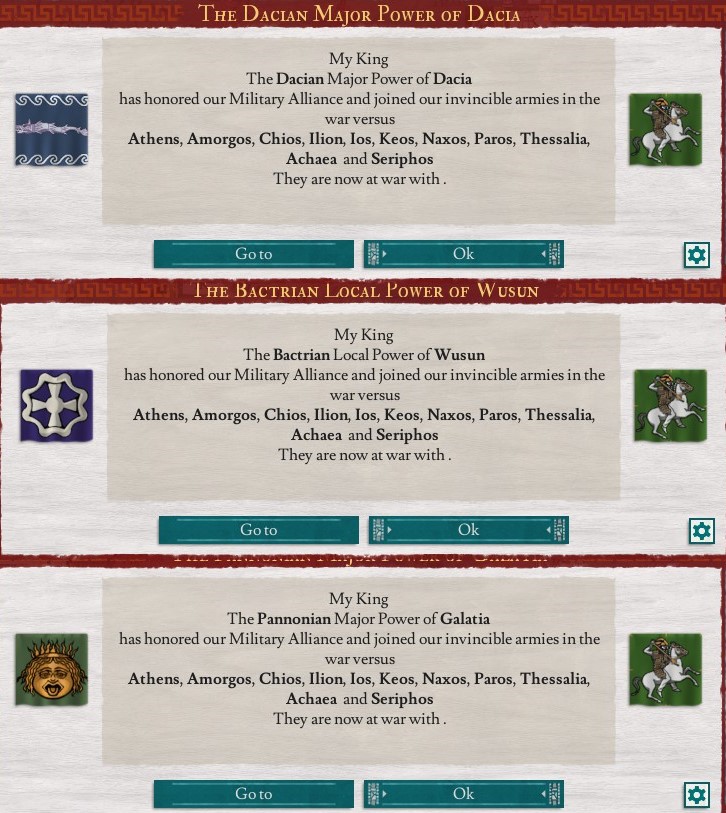 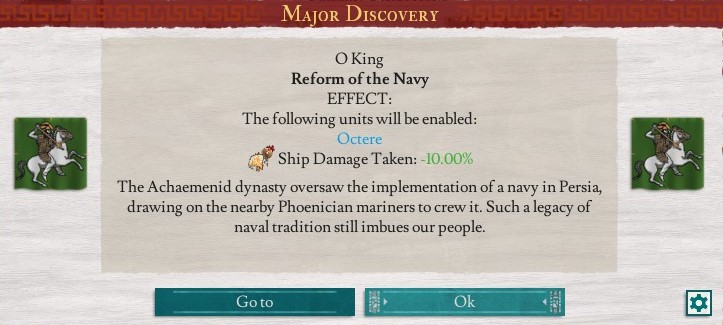 The consequences for those venerable cities - Athens, Delphi, Sparta and others - were dire in terms of sovereignty, but do seem to have been (as far as can be told) reasonably mild in the frame of classical warfare. For Aegypt, however, the problem was far more pressing - the attrition and damage to the army of the Galatian front had left frontier garrisons weak and poorly manned. When Carthage, citing the ‘trespasses’ of one such garrison into their land, declared an invasion of Aegypt, the response of the Aegyptian army was slow and haphazard - several generals lay dead in the Hellenic mountains or Galatian highlands, and who held ultimate command unclear, especially with the mental decline of Kleopatra. 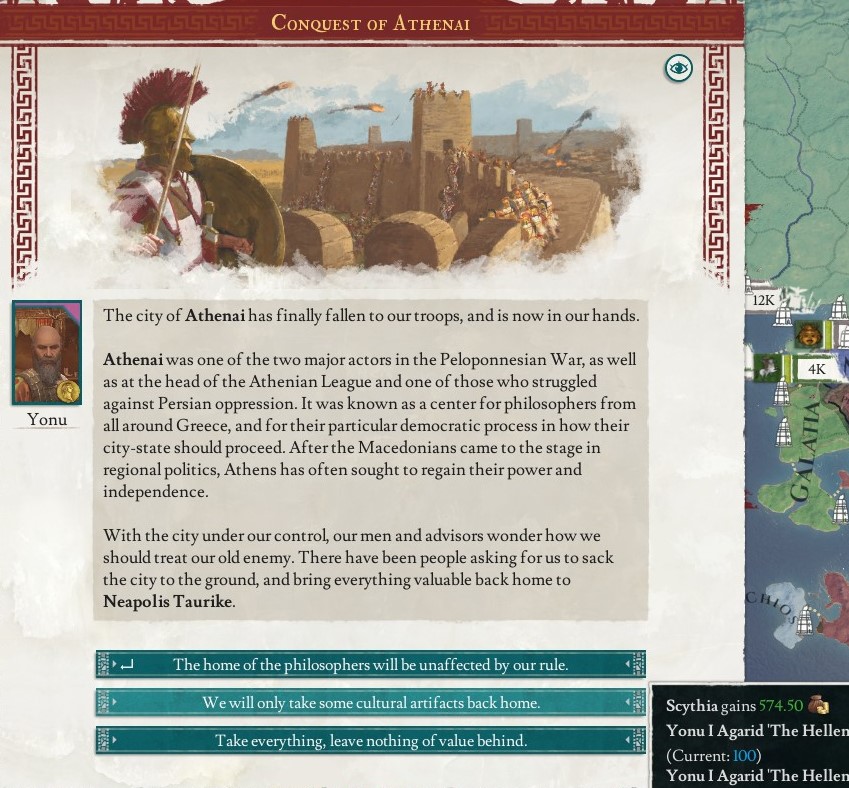 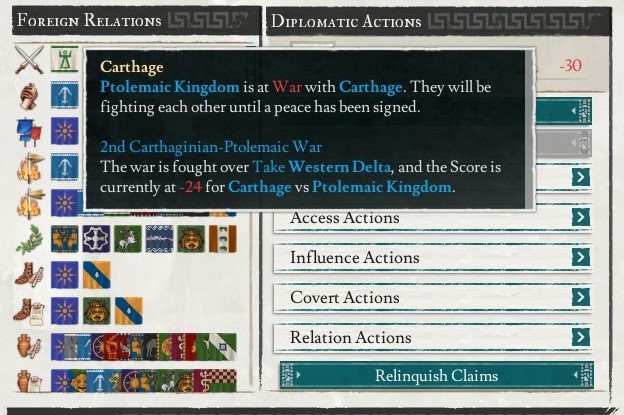 What would the world look like if the Aegyptians had a more robust, less depleted officer corps? If the army hadn’t been near-mutiny? Or if Kleopatra had not lingered, unable to rule effectively but unable or unwilling to pass on the throne to anyone but her incompetent children or long-dead siblings? Where Kallipos Africanus, who lead his army through Cyrencia and successfully laid siege to Annesel, a coastal fort thought to be safe in the heartlands, had overall command, or a fleet which could deliver him to Carthage proper, rather than perishing during the March of Thirst? A world where Aegypt’s growing status as the hellenic state caused it to turn its mind to defense against the Western threat before Punics watered their elephants in the Nile?  Such questions are endlessly fascinating, though best left to writers and novelists, rather than historians. In terms of what actually occurred, the conquest of the Delta, and the ‘accidental’ death of Kleopatra in the chaotic flight down the Nile left Ptolemaios X on the throne - a man who has grown to adulthood believing himself and Alexandria to be the center of all civilisation and enlightenment, and was now left ruling a mutilated kingdom from Memphis - still a grand metropolis, but a clearly kemetic, not hellenic, city. Despondent and lost, he seemed a man who - or so the chronicles we have claim - had lost his will to live or, if you believe the Punic accounts, was haunted by the shade of Kleopatra for his (alleged) role in her riverbarge's sinking into a bloat of hippopotami. 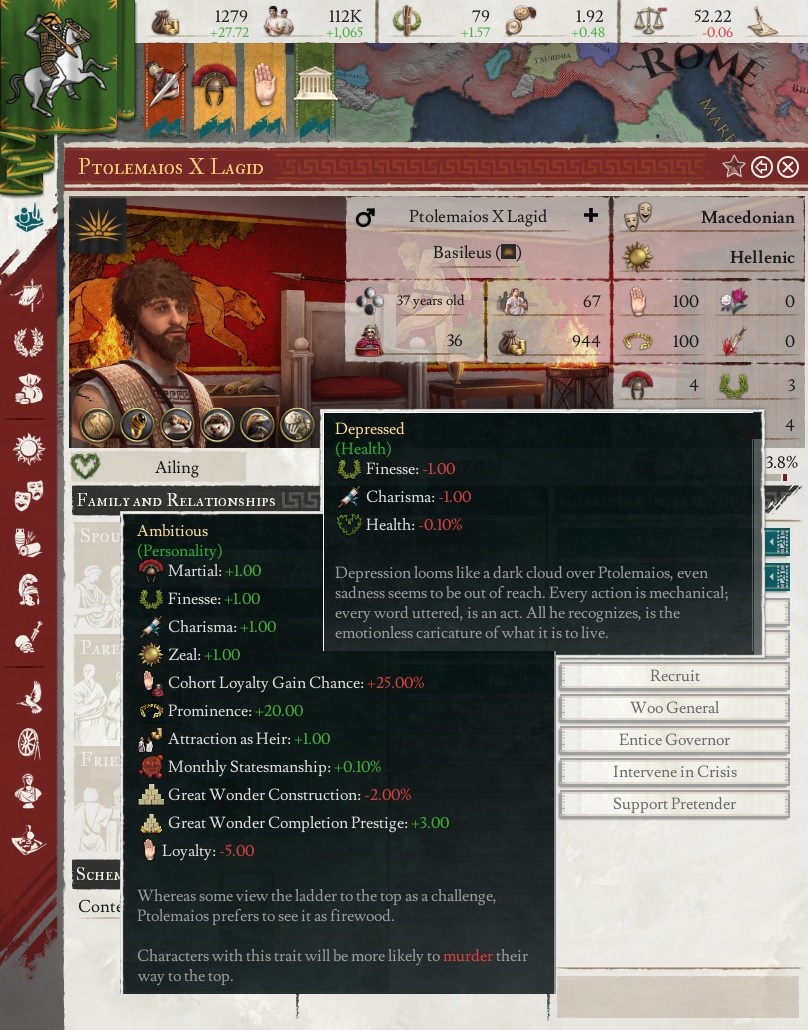 For Scythia, the Carthginian conquest of the Delta was a unqualified stroke of good fortune - trade from the far East and travelers from the powerful Arabic Minaean state (the kingdom of Yamnat) flocked to Scythian shores in greater numbers. Such growing trade offered opportunities for new styles and forms to flourish, and the complete Scythian victory over the Hellenes made them more open to tolerating and promoting Greek artisans than they had been before. From the East, a vast shipment of ebony was procured, and added to the marble looted from Athens. Trade also encouraged internal developments in the Scythian economy - old mines were restored and new ones prospected to generate surpluses which could be exported or, in the case of silver, hoarded.  This economic activity, Yonu’s demonstration of kingship and willingness to embrace Hellenic art and architecture - it all reaches its apex in the Yadkuvændon. The problem for the serious historian is that this is where the sources diverge the most wildly and religious traditions become their most insistent on their version of the events being authenticated. Built in the hellenic shrine style with the Partheon’s marble and inlaid with ebony, topped with a silver roof, the Yadkuvændon announced the arrival of Scythia as one of the great civilisations of antiquity and is correctly seen as the pinnacle of the golden age of Scythia.  There are commonalities which can be found in the traditional accounts, elements which likely have their roots in some sought of truth. They are: Firstly, that Yonu drew up the plans for the Yadkuvændon and was involved in sponsoring its design and construction. Secondly, on or very shortly after the start of the construction, Yonu dies (or for the Hypsistarians, is taken up directly into heaven). Thirdly: The new King Suklodane takes the throne and the crown but immediately suffers a massive stroke, sending him into a coma. OOC: Construction started 11 March. Yonu died on 29 March. Traditionally, the crucifixion happened on the 25 March, so Yonu died the day after Easter. Of course, the chiefs in their wisdom elected a brain damaged fool, thanks to Imperator’s “interesting” succession and heir strength/weighting mechanics 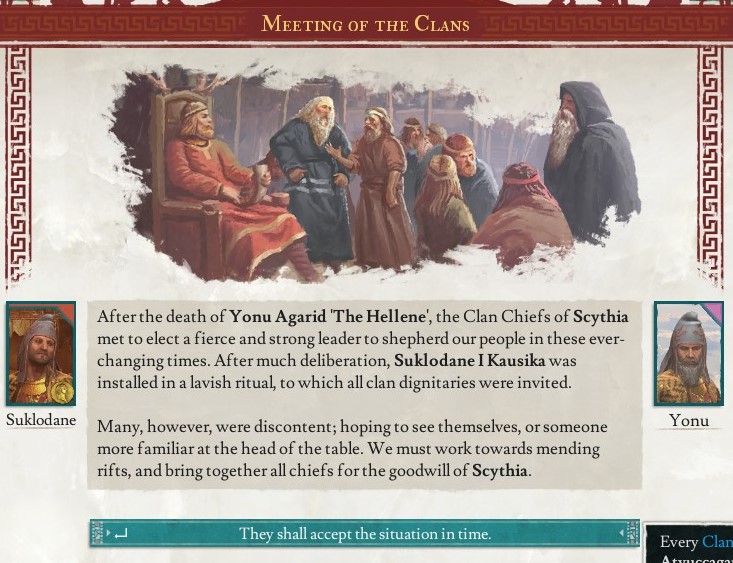 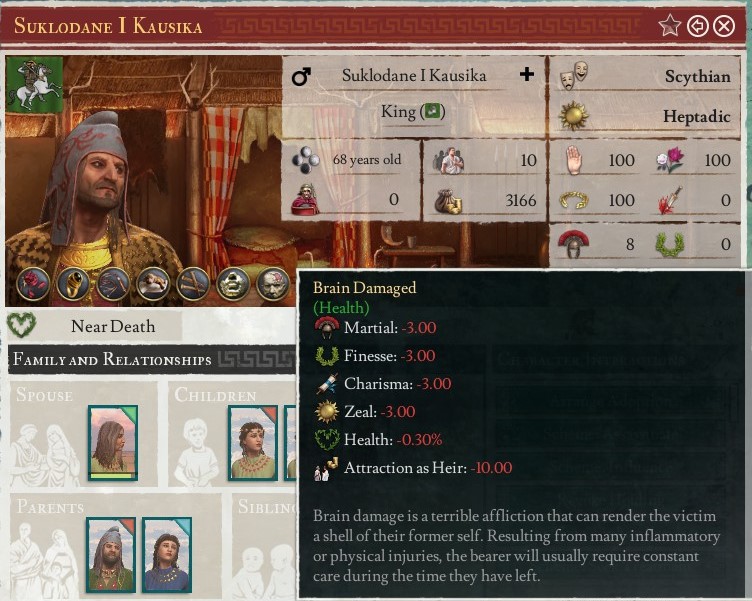 Are the stories about Suklodane being cursed for ceasing construction of the Yadkuvændon accurate? It’s unclear, but it seems apparent that from a very early time disrespect of the Yadkuvændon was considered foolhardy and dangerous in the extreme, and a lack of timeliness and financing in its construction after Yonu’s death was blamed for a devastating earthquake in Larisa. Ultimately, there isn’t enough evidence for us to be clear for who - or for what - the original dedication of Yadkuvændon was, but it was nonetheless a site of great spiritual importance. It is no coincidence that after Suklodane’s death (after several years in a coma), his former regent Atyucca had coins struck of his coronation outside it.  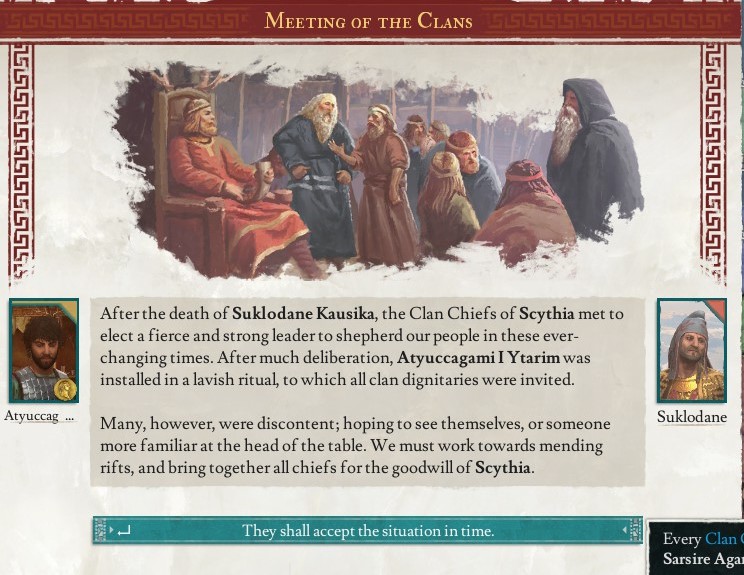 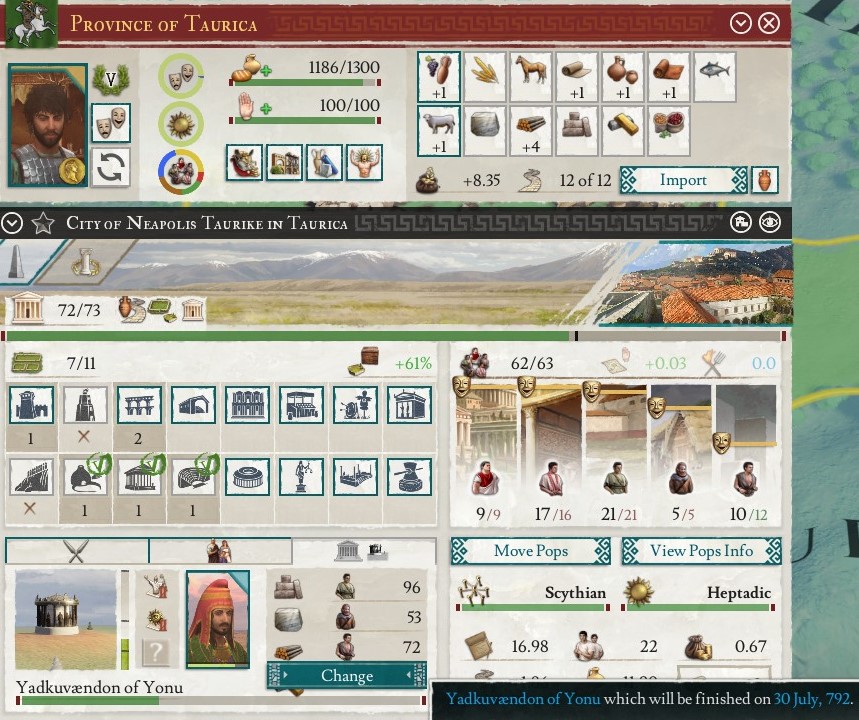 Atyyucca was by no means unusual in his devotions at this time - the Christian cult was spreading, attractive particularly to the Greek intelligentsia and underclass, and penetrating even high society in the Selucid kingdom. Amongst the Scythian nobility, a monolatric cult of Tabiti was spreading, and plans for a great temple in her honor in the metropolis of Pella were drawn up, even if it would be some time before construction could see completion. 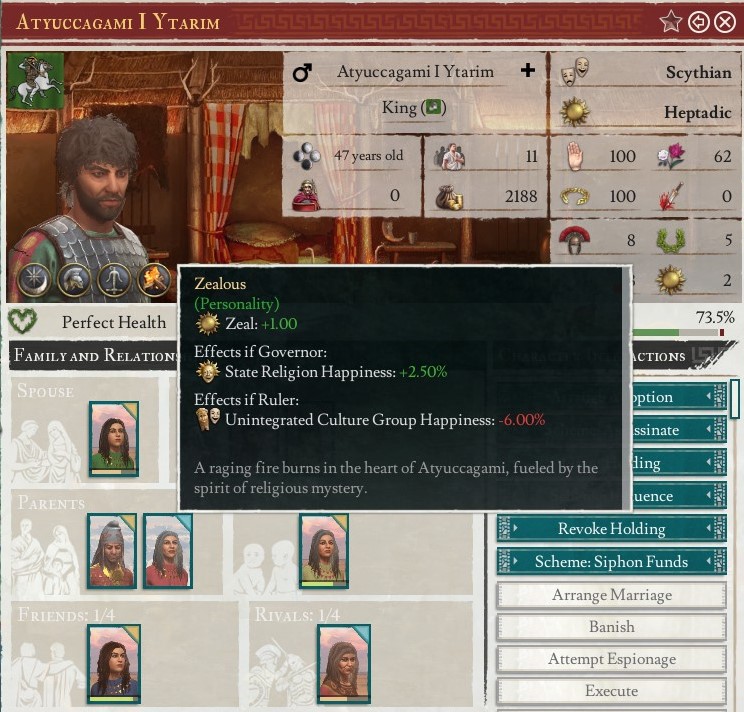 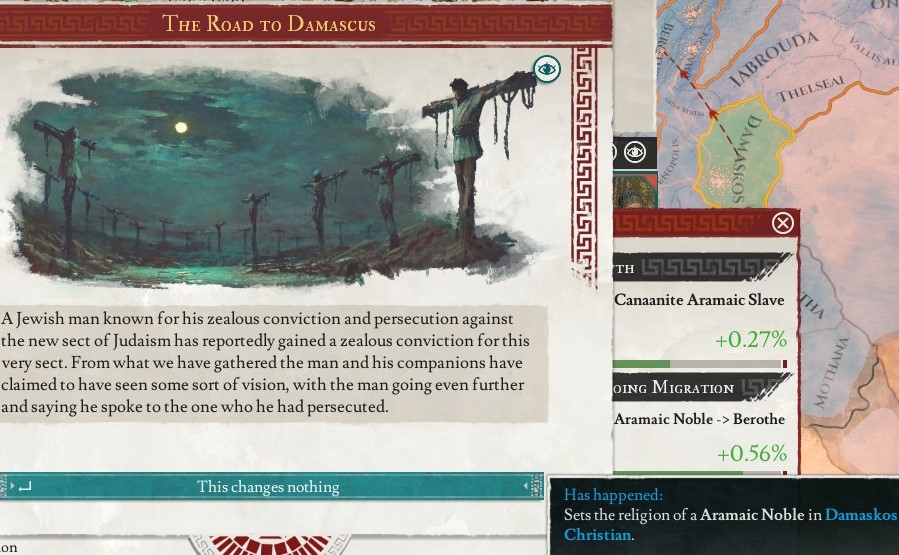 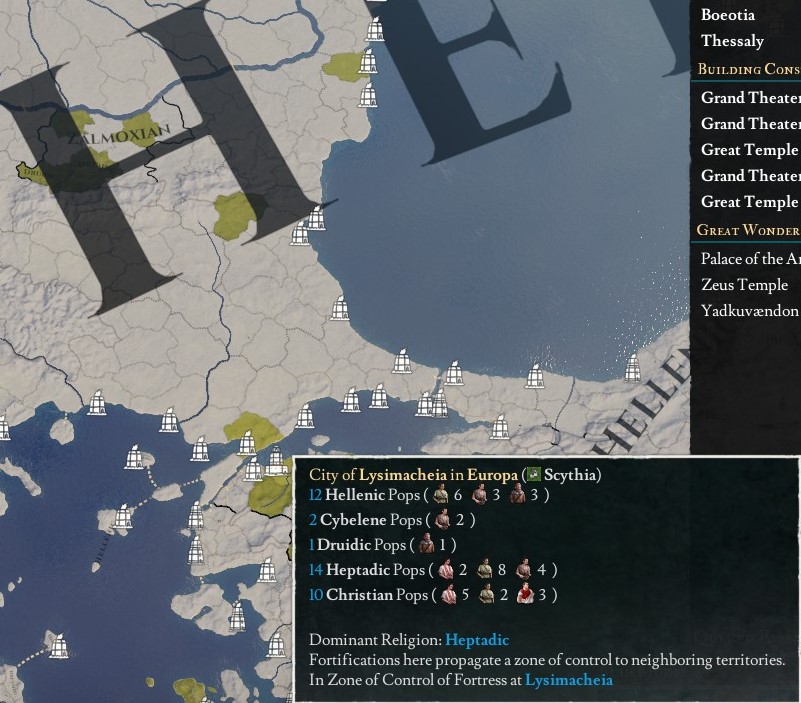 Christian communities in Scythia approximately 10 years after the Crucifixion. Note the rapid spread amongst the hellenic underclass, and the clustering near the Dacian trading hub south of the Istros As Scythia prospered and the Nile ran red, the question before the Scythian nobility was whether the tides of change should be embraced: 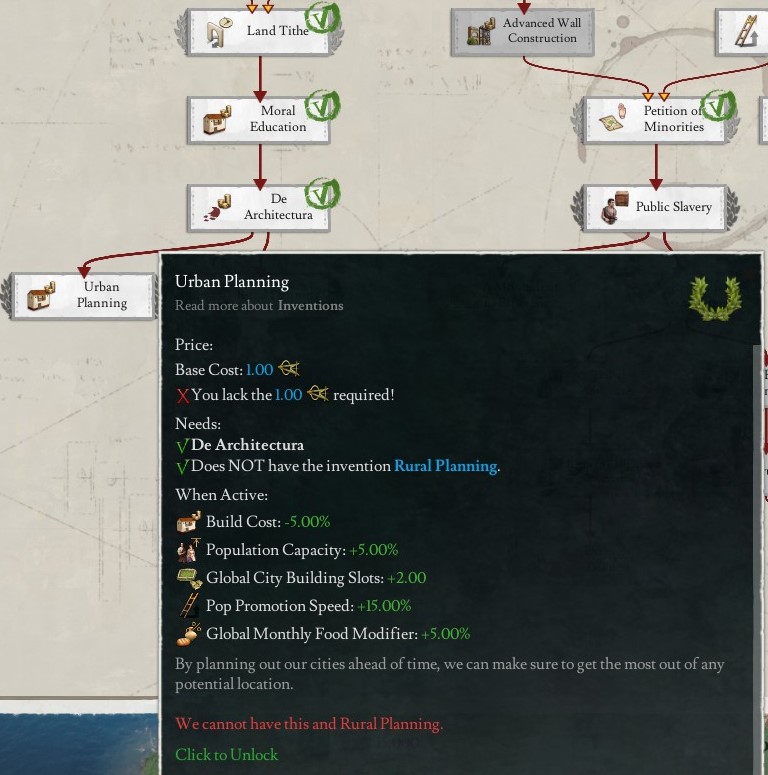 Or rejected:  ooc: these are mutually exclusive technologies. We’ve been going pretty city friendly, but both are reasonably nice - an extra building for rural settlements doubles the number of allowed buildings, so is pretty beefy, whereas obvious urban planning significantly pumps up the extent to which our cities can be built up. Europe: 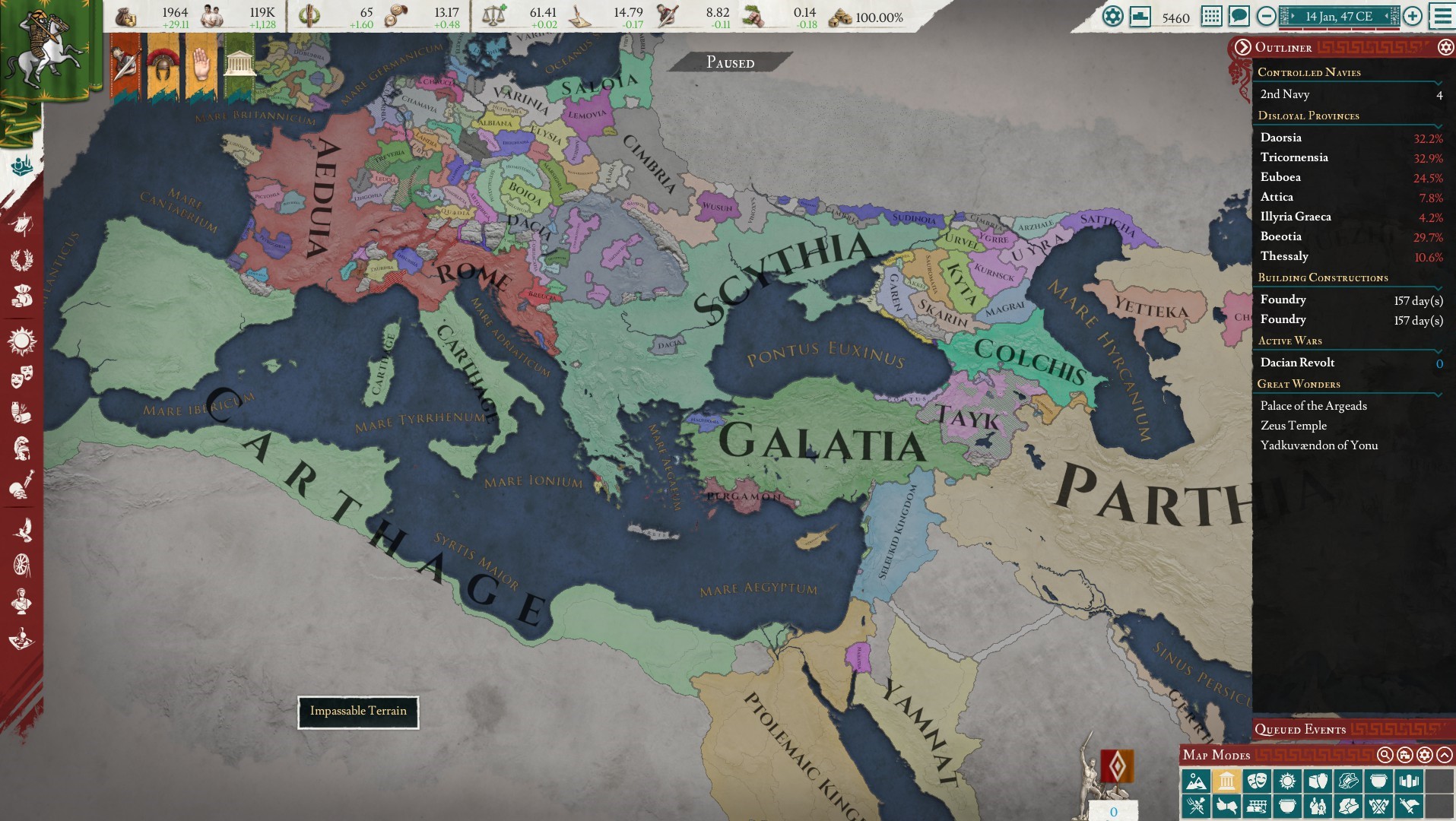
Yuiiut fucked around with this message at 12:40 on Sep 14, 2022 |
|
|
|
Let all the land prosper! Rural planning.
|
|
|
|
More cities means fewer horses. Rural planning.
|
|
|
|
Urban Planning, we must have cities fit for horses!
|
|
|
|
AJ_Impy posted:Urban Planning, we must have cities fit for horses!
|
|
|
|
Urban Planning
|
|
|
|
Rural planning. A building for horses and a building for us in every province!
|
|
|
|
AJ_Impy posted:Urban Planning, we must have cities fit for horses!
|
|
|
|
Rural planning
|
|
|
|
Everyone knows that horses work best in cities.
|
|
|
|
Rural Planning so we can have more small cities instead of a few really big ones. That way we can ride horses between them!
|
|
|
|
Rural Planning. We must not forget our roots.
|
|
|
|
Rural Planning
|
|
|
|
Urban Planning.
|
|
|
|
Urban Planning
|
|
|
|
Rural Planning How likely is it for countries to fall apart in this game? Is Carthage likely to fall apart like (irl) Rome did?
|
|
|
|
Chatrapati posted:Rural Planning It's rare - we'd need something that crippled the Empire's manpower and depleted frontier garrisons at the same time they came under intense pressure from outside peoples seeking to move inside the Empires borders. Everything linked is modelled to some degree, but any currently existing empire is likely to persist in some form (which was part of the reason I started in 150BC, Zoro Parthia > Selucid Persia) until we port over into CK2 (the converter even comes with a extremely cool in-game ability for massive empires to divide themselves in two to relieve administrative burdens, which is part of the reason we'll be going CK2-CK3). CK2 has (with mods) much more of an ability to represent internal divisions and slow collapse.
|
|
|
|
Anyway to rename Rome? I suppose you could regard it as an interesting flavor thing that they're still holding on in northern Italy, so consumed by fantasies of revenge that they steadfastly refuse to change their name.
|
|
|
|
Buddy they didn't change their name when all they held was Greece
|
|
|
|
Sherbert Hoover posted:Buddy they didn't change their name when all they held was Greece
|
|
|
|
Yeah I can't imagine whatever the hell is left of the roman state being anything but some sort of weird classical-era revanchist dictatorship
|
|
|
|
That is a good definition for every iteration of the actual roman empire
|
|
|
|
Rural Planning
|
|
|
|
The Etruscans have a mission which can change the name of Rome to 'Roma Perdita' - "Lost Rome", which feels appropriate in this context. I'll fire it through the console. Speaking of linguistics, does anyone have any sources for ancient Iranian languages? The Yadkuvændon is a ungainly blend of Xerxes' inscriptions for the Yad- prefix (revere, worship) and Ossetic kuvændon for shrine/sacred space, so likely glosses into 'revered/worshipful holy place'. Then again, the Greeks used to just call the Parthenon ὁ νᾱός ('The Temple') so simple nomenclature is likely fine Yuiiut fucked around with this message at 22:18 on Sep 15, 2022 |
|
|
|
Urban planning
|
|
|
|

|
| # ? May 4, 2024 01:42 |
|
Yuiiut posted:It's rare - we'd need something that crippled the Empire's manpower and depleted frontier garrisons at the same time they came under intense pressure from outside peoples seeking to move inside the Empires borders. I see... Then large empires in this game mainly become smaller due to other empires becoming larger? Like if Aeduia were to take land from Carthage for example. The administrative stuff CK2 (with mods) offers is really fun. It's my basic understanding that the French-syle feudalism depicted in CK is a result of warlords seeking and consolodating power following the collapse of Rome. I think it could be fun if more states had Byzantine or tribal-style governments in response to a potential lack of collapse in this game.
|
|
|




























